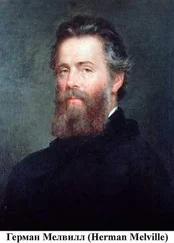At last, puzzled to comprehend the meaning of such a knot, Captain Delano addressed the knotter:—
"What are you knotting there, my man?"
"The knot," was the brief reply, without looking up.
"So it seems; but what is it for?"
"For some one else to undo," muttered back the old man, plying his fingers harder than ever, the knot being now nearly completed.
While Captain Delano stood watching him, suddenly the old man threw the knot towards him, saying in broken English—the first heard in the ship—something to this effect: "Undo it, cut it, quick." It was said lowly, but with such condensation of rapidity, that the long, slow words in Spanish, which had preceded and followed, almost operated as covers to the brief English between.
For a moment, knot in hand, and knot in head, Captain Delano stood mute; while, without further heeding him, the old man was now intent upon other ropes. Presently there was a slight stir behind Captain Delano. Turning, he saw the chained negro, Atufal, standing quietly there. The next moment the old sailor rose, muttering, and, followed by his subordinate negroes, removed to the forward part of the ship, where in the crowd he disappeared.
An elderly negro, in a clout like an infant's, and with a pepper and salt head, and a kind of attorney air, now approached Captain Delano. In tolerable Spanish, and with a good–natured, knowing wink, he informed him that the old knotter was simple–witted, but harmless; often playing his odd tricks. The negro concluded by begging the knot, for of course the stranger would not care to be troubled with it. Unconsciously, it was handed to him. With a sort of congé, the negro received it, and, turning his back, ferreted into it like a detective custom–house officer after smuggled laces. Soon, with some African word, equivalent to pshaw, he tossed the knot overboard.
All this is very queer now, thought Captain Delano, with a qualmish sort of emotion; but, as one feeling incipient sea–sickness, he strove, by ignoring the symptoms, to get rid of the malady. Once more he looked off for his boat. To his delight, it was now again in view, leaving the rocky spur astern.
The sensation here experienced, after at first relieving his uneasiness, with unforeseen efficacy soon began to remove it. The less distant sight of that well–known boat—showing it, not as before, half blended with the haze, but with outline defined, so that its individuality, like a man's, was manifest; that boat, Rover by name, which, though now in strange seas, had often pressed the beach of Captain Delano's home, and, brought to its threshold for repairs, had familiarly lain there, as a Newfoundland dog; the sight of that household, boat evoked a thousand trustful associations, which, contrasted with previous suspicions, filled him not only with lightsome confidence, but somehow with half humorous self–reproaches at his former lack of it.
"What, I, Amasa Delano—Jack of the Beach, as they called me when a lad—I, Amasa; the same that, duck–satchel in hand, used to paddle along the water–side to the school–house made from the old hulk—I, little Jack of the Beach, that used to go berrying with cousin Nat and the rest; I to be murdered here at the ends of the earth, on board a haunted pirate–ship by a horrible Spaniard? Too nonsensical to think of! Who would murder Amasa Delano? His conscience is clean. There is some one above. Fie, fie, Jack of the Beach! you are a child indeed; a child of the second childhood, old boy; you are beginning to dote and drule, I'm afraid."
Light of heart and foot, he stepped aft, and there was met by Don Benito's servant, who, with a pleasing expression, responsive to his own present feelings, informed him that his master had recovered from the effects of his coughing fit, and had just ordered him to go present his compliments to his good guest, Don Amasa, and say that he (Don Benito) would soon have the happiness to rejoin him.
There now, do you mark that? again thought Captain Delano, walking the poop. What a donkey I was. This kind gentleman who here sends me his kind compliments, he, but ten minutes ago, dark–lantern in had, was dodging round some old grind–stone in the hold, sharpening a hatchet for me, I thought. Well, well; these long calms have a morbid effect on the mind, I've often heard, though I never believed it before. Ha! glancing towards the boat; there's Rover; good dog; a white bone in her mouth. A pretty big bone though, seems to me.—What? Yes, she has fallen afoul of the bubbling tide–rip there. It sets her the other way, too, for the time. Patience.
It was now about noon, though, from the grayness of everything, it seemed to be getting towards dusk.
The calm was confirmed. In the far distance, away from the influence of land, the leaden ocean seemed laid out and leaded up, it's course finished, soul gone, defunct. But the current from landward, where the ship was, increased; silently sweeping her further and further towards the tranced waters beyond.
Still, from his knowledge of those latitudes, cherishing hopes of a breeze, and a fair and fresh one, at any moment, Captain Delano, despite present prospects, buoyantly counted upon bringing the San Dominick safely to anchor ere night. The distance swept over was nothing; since, with a good wind, ten minutes' sailing would retrace more than sixty minutes, drifting. Meantime, one moment turning to mark "Rover" fighting the tide–rip, and the next to see Don Benito approaching, he continued walking the poop.
Gradually he felt a vexation arising from the delay of his boat; this soon merged into uneasiness; and at last—his eye falling continually, as from a stage–box into the pit, upon the strange crowd before and below him, and, by–and–by, recognizing there the face—now composed to indifference—of the Spanish sailor who had seemed to beckon from the main–chains—something of his old trepidations returned.
Ah, thought he—gravely enough—this is like the ague: because it went off, it follows not that it won't come back.
Though ashamed of the relapse, he could not altogether subdue it; and so, exerting his good–nature to the utmost, insensibly he came to a compromise.
Yes, this is a strange craft; a strange history, too, and strange folks on board. But—nothing more.
By way of keeping his mind out of mischief till the boat should arrive, he tried to occupy it with turning over and over, in a purely speculative sort of way, some lesser peculiarities of the captain and crew. Among others, four curious points recurred:
First, the affair of the Spanish lad assailed with a knife by the slave boy; an act winked at by Don Benito. Second, the tyranny in Don Benito's treatment of Atufal, the black; as if a child should lead a bull of the Nile by the ring in his nose. Third, the trampling of the sailor by the two negroes; a piece of insolence passed over without so much as a reprimand. Fourth, the cringing submission to their master, of all the ship's underlings, mostly blacks; as if by the least inadvertence they feared to draw down his despotic displeasure.
Coupling these points, they seemed somewhat contradictory. But what then, thought Captain Delano, glancing towards his now nearing boat—what then? Why, Don Benito is a very capricious commander. But he is not the first of the sort I have seen; though it's true he rather exceeds any other. But as a nation—continued he in his reveries—these Spaniards are all an odd set; the very word Spaniard has a curious, conspirator, Guy–Fawkish twang to it. And yet, I dare say, Spaniards in the main are as good folks as any in Duxbury, Massachusetts. Ah good! last "Rover" has come.
As, with its welcome freight, the boat touched the side, the oakum–pickers, with venerable gestures, sought to restrain the blacks, who, at the sight of three gurried water–casks in its bottom, and a pile of wilted pumpkins in its bow, hung over the bulwarks in disorderly raptured.
Читать дальше








